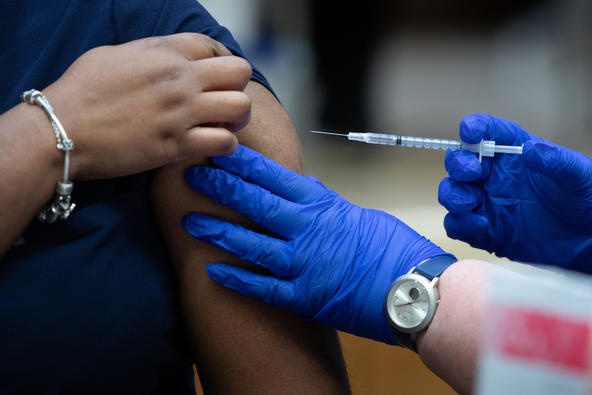COVID-19 Vaccination Important for Underrepresented Populations

Underrepresented populations in the United States have been hit particularly hard by the coronavirus pandemic. They are contracting, being hospitalized and dying from the virus at higher rates than white Americans.
According to the National Institutes of Health, Latinos, African Americans and American Indians make up more than half of all coronavirus-related cases, despite being only a third of the population.
Along with the National Institute on Minority Health and Health Disparities, it is important to encourage COVID-19 vaccination to help prevent the spread of the virus and bring an end to the pandemic.
The COVID-19 vaccine is available at the University of Kentucky by registering at ukvaccine.org.
A few facts to know about getting your shot:
It’s extremely important to get your COVID-19 vaccine and to encourage others to get vaccinated.
Getting the vaccine not only means you’re protecting yourself but you’re also protecting others, including those who could suffer from more severe cases of the coronavirus or those who cannot get the vaccine, like infants and children.
If you’re unsure of getting the shot, know that the vaccines for the coronavirus are safe and effective. They have been authorized by the FDA and meet the agency’s strict standards.
You might experience some side effects from the shot, but this is because it’s working to create an immune response in your body. This is normal. If you do experience feelings of fatigue, achiness or chills, these symptoms shouldn’t last more than two or three days.
It is not possible to contract COVID-19 from the vaccines.
If you’re receiving a vaccine that requires two doses, be sure to attend your second appointment. The first dose begins to build your immune response, while the second one gives you the full protection of the vaccine.
It takes about one to two weeks after your second shot to get the full protection, so be sure you’re still practicing healthy habits and wearing your face mask when you’re in public or in accordance with CDC guidelines.
More from this series Research Priorities - UNITE
Credits
Tukea Talbert (Chief Diversity Officer, UK HealthCare)


